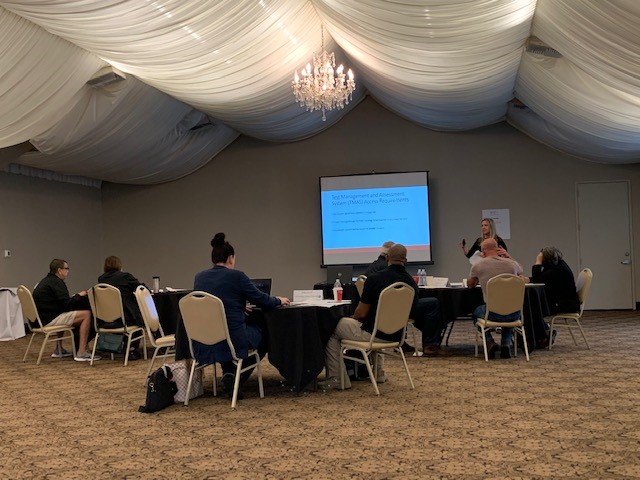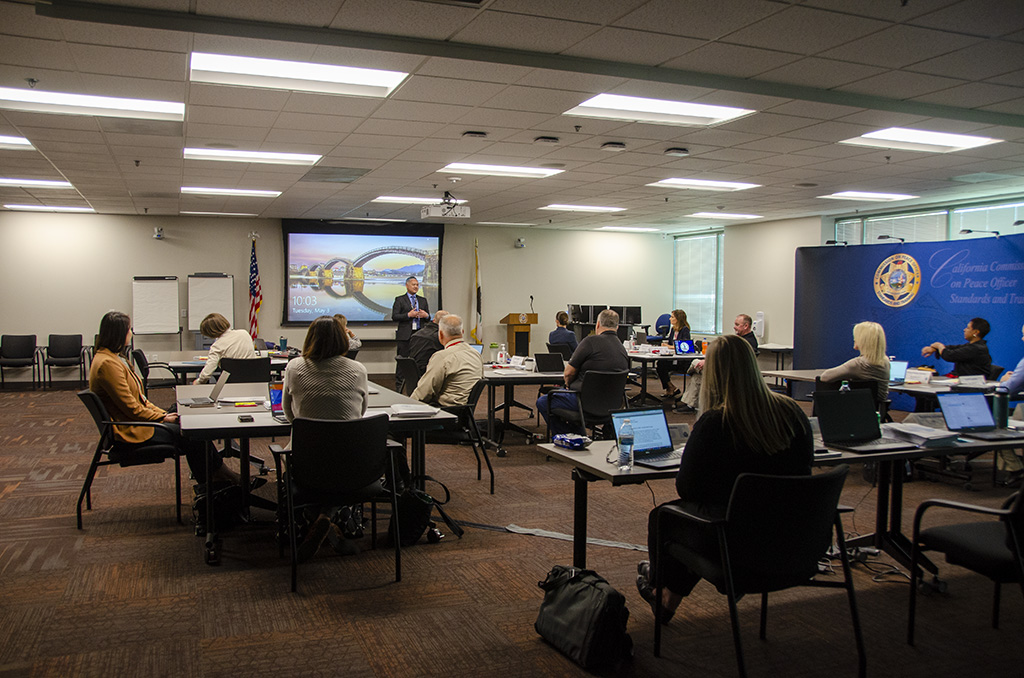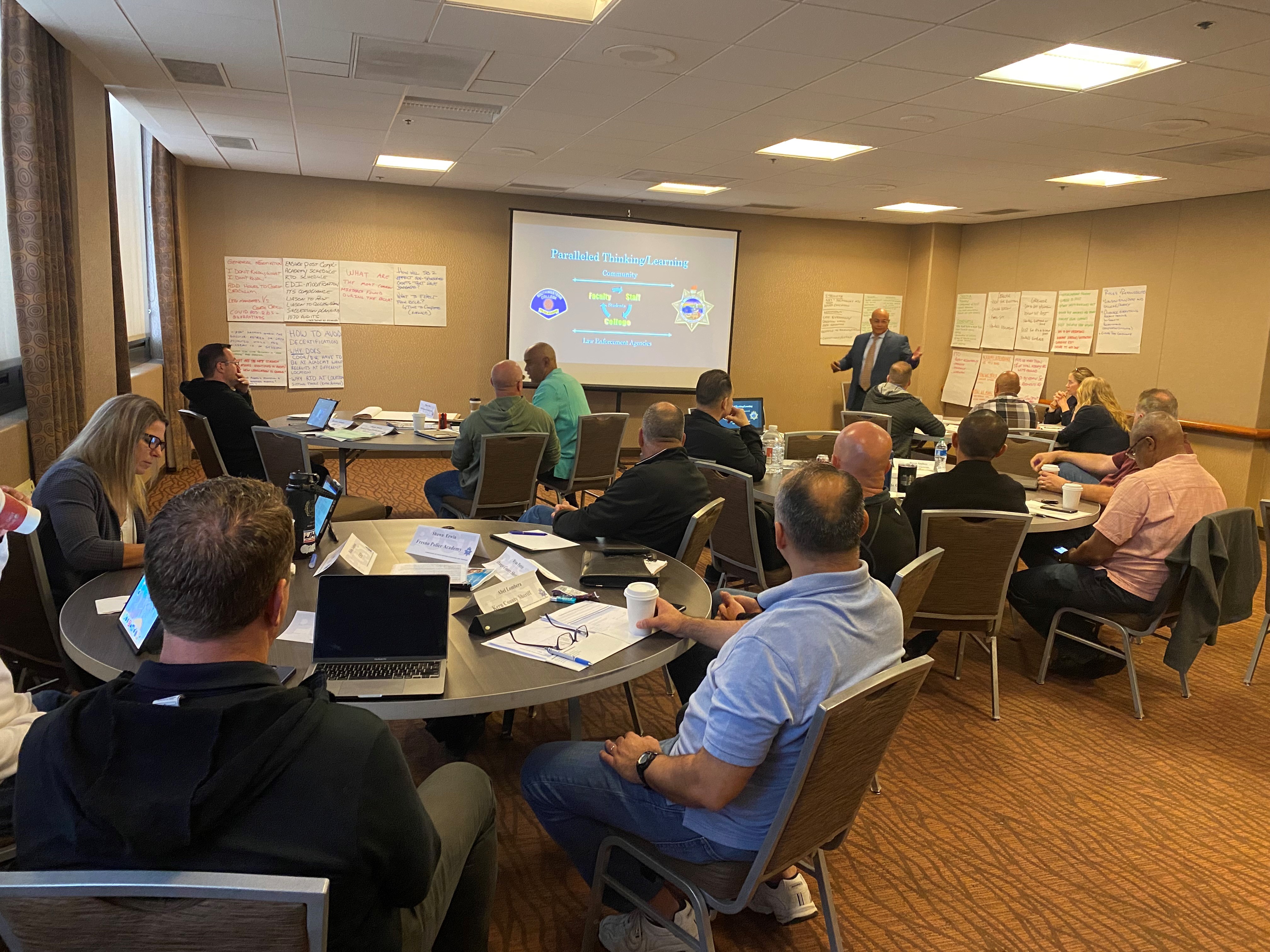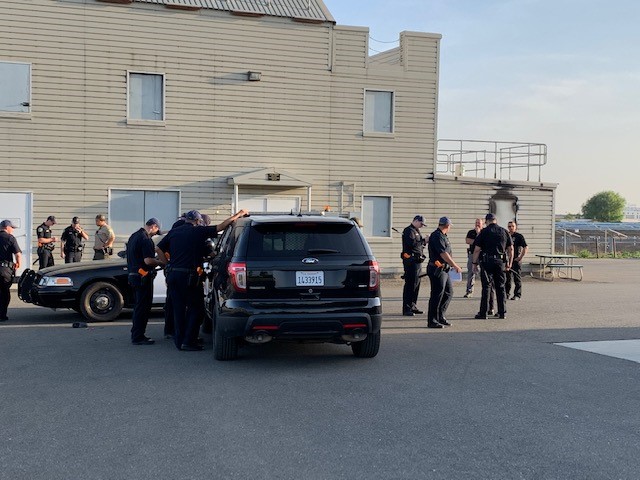Basic Training Bureau Facilitates Presenter Workshop for the PC 832 Arrest and Firearms Course in Folsom, CA
 Workshop for the PC 832 Arrest and Firearms Course in Folsom
Workshop for the PC 832 Arrest and Firearms Course in Folsom
On May 10-11, 2022, the Basic Training Bureau (BTB) facilitated a 12-hour Presenter Workshop for the PC 832 Arrest and Firearms Course in Folsom. The workshop provided presenters of the PC 832 courses with information regarding how to certify and maintain their basic courses, which included course certification requirements, information on the test security administration and policy, guidelines for student safety, Commission Regulations and Training Procedures, and an overview of the Basic Course Certification Review (BCCR) process.
For additional information regarding the PC 832 Arrest and Firearms Course and Presenter Workshop, please contact Carrie Hollar, Law Enforcement Consultant in the Basic Training Bureau, at (916) 227-4661.
BTB Facilitates Officer Wellness Workshop for Basic Courses
 Officer Wellness Workshop
Officer Wellness Workshop
In early May 2022, the BTB began the development of a new learning domain for the Basic Courses regarding Officer Wellness. A diverse group of subject matter experts from around the state, which included medical and psychological professionals, peace officers, and academy instructors, met to begin the development of the Training and Testing Specifications (TTS) and Student Workbook content for Learning Domain (LD) 14 – Officer Wellness.
For information regarding the Basic Course TTS and Workbooks, please contact Raymund Nanadiego, Law Enforcement Consultant with the Basic Training Bureau at (916) 227-4852.
BTB Facilitates Director/Coordinator Course in Orange, CA
 Director Coordinator Course
Director Coordinator Course
During the week of May 17-20, 2022, the BTB facilitated a 24-hour Director/Coordinator Course in Orange, CA, where 24 Academy Directors and Coordinators from around the state were in attendance.
This course is mandated for all newly appointed Directors and Coordinators of Basic Courses and must be completed within one year of appointment. Course instruction includes Roles and Responsibilities, Commission Regulations and Procedures, Instructional Design, Instructional Planning, Quality, & Resources, Electronic Data Interchange (EDI), Testing and Remedial Training Requirements, Liabilities and Legal Issues, Legislative Mandates, Risk Management and Academy Safety Protocols and the BCCR process.
For more information regarding the Director/Coordinator Course, please contact Kirk Bunch, Law Enforcement Consultant in the Basic Training Bureau, at (916) 227-3896.
Basic Course Certification Review at Yuba College Law Enforcement Training Academy
 BCCR Yuba College
BCCR Yuba College
The BTB recently conducted a BCCR of the law enforcement training academy at Yuba College. The BCCR is an in-depth review of Basic Course presenters and the certification of their courses. The BCCR ensures the quality, integrity, and safety of entry-level peace officer training in California. The Commission on Peace Officer Standards and Training (POST) ensures all certified Basic Course presenters are in compliance with the Penal Codes and Government Codes related to POST, Commission Regulations, Commission Procedures, and the TTS.
For questions regarding the BCCR process, please contact Bill Lewis, Staff Services Manager in the Basic Training Bureau, at (916) 227-4856.
Training Managers Course Presented at Santa Rosa Junior College Public Safety Training Center
On May 3-4, 2022, students attended the 24-hour Training Managers Course presented by Santa Rosa Junior College Public Safety Training Center. The course is designed for newly assigned Training Managers. Topics included developing a training plan, liability issues, and management of training records. Additionally, POST staff presented information on the POST Website, the Learning Portal, course certification, POST regulations, and agency compliance inspections.
Please contact Santa Rosa Junior College Public Safety Training Center at (707) 836-2912 to register for the next course which is scheduled for November 1-2, 2022.
Questions about the course may be directed to the Training Delivery and Compliance Bureau at (916) 227-4860.
Training Coordinator Course presented in Ontario, CA
Thanks to the Ontario Police Department for hosting the POST Training Coordinators Course on May 10-11, 2022, which was presented by the Training Delivery and Compliance Bureau.
This 16-hour course is designed to teach a newly assigned Training Coordinator the fundamentals of the job from the POST perspective. Topics included: background compliance, legal issues, legislative mandates, Electronic Data Interchange (EDI), course certification process, and more. The class consisted of 38 students from 26 POST presenters and agencies. Thanks to Daniel Schmitt, Region 10 POST Consultant, Mark Flores, Region 9 POST Consultant to the Ontario PD, Cliff Lohner, Ashley Young, and Jacqueline Lopez for coordinating the class, along with Chief Mike Lorenz, for allowing us to use a training room to provide the training to the region.
For questions about the Training Coordinators Course, please contact Christine Ford, Law Enforcement Consultant, with the Training Delivery and Compliance Bureau, at 916-227-0472.
Public Safety Dispatchers’ Basic Course Workshop
On May 11-12, 2022, POST hosted a two-day workshop with a group of Public Safety Dispatcher subject matter experts to update LD100 – Professional Orientation and Ethics and LD103 – Interpersonal Communication. Workshops are two days long and take place once a month either online or in person.
The workgroup addressed some topics that are impacting our peace officer partners, like the duty to intercede, as well as being cognizant of personal bias, implicit and explicit. Learning activities for both learning domains have been updated.
If you are interested in being considered as a subject matter expert for additional POST Public Safety Dispatcher projects, please contact Jennifer Dwyer, Staff Services Manager/Project Manager in the Management Counseling and Projects Bureau, at (916) 227-0477.
New Video Highlights: Use of Force Policy Changes for Risk of Positional Asphyxia
POST has released a brief informational video that provides insight into the recent legal update on Government Code Section (GC) 7286.5(a), the law relating to agency use of force policies, and risk of positional asphyxia. This news-style video, On-Scene: Positional Asphyxia, clarifies what this updated law means to peace officers, and captures expert insights into how officers may shift their mindset. Restraint techniques and transportation methods that may create the most risk for positional asphyxia are highlighted, as well as medical warning signs officers should look for. The video reinforces the need for agencies to develop a strategy that emphasizes an officer’s responsibility to monitor, recognize, take action, and manage the safety of an individual to help mitigate the risk of positional asphyxia, resulting in a better approach to custody and care, officer and community safety, tactical considerations, and risk management.
Separately, a new self-paced course, Legal Update: Positional Asphyxia (GC 7286.5), was released in February 2022 and provides an update on the changes that Assembly Bill 490 made to GC 7286.5. Upon completion of the course, trainees will be able to define positional asphyxia, identify risks for positional asphyxia, and list actions that mitigate the risk of positional asphyxia. The 20-minute course offers one hour of Continuing Professional Training credit.
The news update video and the training course are available exclusively at the POST Learning Portal.
For questions about the news update video, please contact Anne Johnston, Senior Law Enforcement Consultant with the Learning Technology Resources Bureau, at (916) 227-4864.
For questions about the training course, please contact Charday Alcaraz, Instructional Designer/Project Manager with the Learning Technology Resources Bureau, at (916) 227-5562.